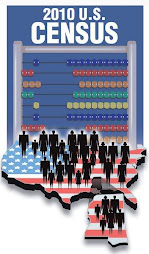Bobby Harrison of the Daily Journal writes about what the future holds in terms of redistricting in MS. Will there be a fight? We'll see in 2011...
JACKSON - Most likely, in early 2011 the Mississippi Legislature will get the state's population data from the U.S. Census Bureau. It will outline what areas of the state have increased population and what areas have lost population.
Then the Legislature must act quickly to redraw the state's 122 House and 52 Senate districts in time to get U.S. Justice Department approval of a redistricting plan before June 1, the qualifying deadline for legislative candidates.
In other words, the Legislature will be acting on a tight time frame to get the districts redrawn in time for the 2011 elections, which will consist of August party primaries and the November general election.
Every other decade, Mississippi faces this problem - the legislative elections occur a year after the Census, meaning the Legislature has little time to reach agreement and put in place new legislative districts.
In 1991, the Legislature did not make it. Racial politics, a speaker's race and other factors prevented the Legislature from reaching agreement. The issue ended up in federal court and with legislators running in 1991 under the old districts and again in 1992 under the new districts.
Legislators will try to avoid the back-to-back elections this time around, but there are no guarantees.
Federal law and court rulings require legislative districts - on the local, state and national levels - to be close to equal in population. Gone are the days when a state House member represented tens of thousands of people in a metro area while a colleague might represented only a few thousand in a rural area.
Under that scenario, the rural population was receiving more representation than urban citizens.
Federal law adheres to the principle of one man, one vote. And in reality, it is one of the most important concepts of our representative democracy.
It is important enough that in 1991, a federal judicial panel said the Legislature could not serve even one four-year term under the old, outdated, unequal district lines. The Legislature served one year under the old lines and had to run again next year.
For a politician, having to run back-to-back years for the same seat has to be a type of electoral purgatory.
If legislators want to avoid that in 2011, they will have to act quickly. After the Legislature adopts a redistricting plan, it also must gain approval of the Justice Department. That can take several weeks.
No doubt, in 2011 there will be a speaker's race just as there was in 1991. In 1991, incumbent Speaker Tim Ford of Baldwyn was being challenged by Ed Perry of Oxford.
After the 2007 campaign, Billy McCoy, D-Rienzi, re-captured the speaker's post by a slim 63-61 margin. Whether McCoy runs or not in 2011, there will be a speaker's race under way when the redistricting process occurs.
That speaker's race could impact the redrawing of the districts lines just as it did in 1991.
The difference is that in 1991 the disagreement broke down, generally speaking, along geographic and urban vs. rural lines, even within the Black Caucus. This time, the divide will most likely will break down along party lines.
Over in the Senate, in 2007 then Lt. Gov.-elect Phil Bryant met with Senate Democrats, who hold a slim majority, and promised not to try to use redistricting as a tool to increase Republican numbers in the Senate. In turn, Democrats promised not to wage what could have been a messy rules fight to try to strip some of the lieutenant governor's Senate powers.
In the past, the leaders of the respective chambers have drawn and gotten approved the redistricting plan for their chamber and it was rubber-stamped by the other chamber. The governor has no official responsibility in the process.
But with a rise in partisan politics in the state, will the Senate try to block the House plan or vice versa? Will Gov. Haley Barbour use his considerable influence over the Senate to try to block the House plan?
If that happens, look for the issue to end up in court again with legislators running in 2011 and 2012.
Subscribe to:
Post Comments (Atom)

No comments:
Post a Comment